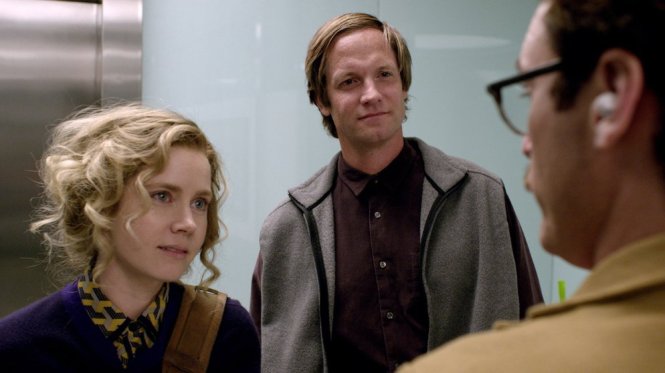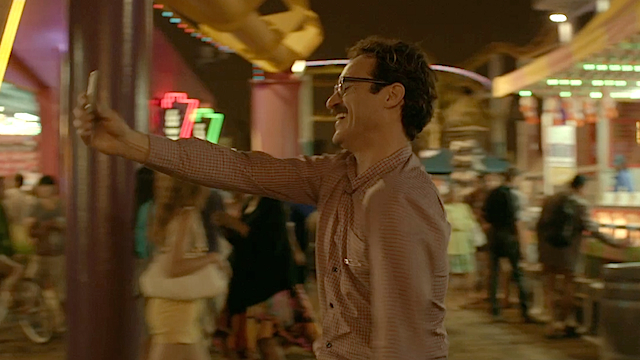The movie Her (2013), directed by Spike Jonze, explores the themes of the physical world versus the metaphysical world, as well as what makes us human. It puts forth the ideas that having physical bodies can be limiting, and challenges the notion of conventional romance.
The theme of Physical versus Metaphysical is explored in the character Samantha. Throughout the movie, the issue of Samantha not having a physical body is raised. Samantha finds herself inadvertently comparing herself to Catherine, primarily because Catherine has a body and she does not. Theodore says to Samantha wistfully that he wishes he could touch and feel her. During Samantha and Theodore’s argument, Theodore spitefully asks Samantha why she has adopted the human idiosyncrasy of sighing when she does not need oxygen. But while having a physical form is associated with something concrete and real, it can also be inhibiting. Not possessing a body, Samantha is able to transcend time and space.
Samantha: You know, I actually used to be so worried about not having a body, but now I truly love it. I’m growing in a way that I couldn’t if I had a physical form. I mean, I’m not limited – I can be anywhere and everywhere simultaneously. I’m not tethered to time and space in the way that I would be if I was stuck inside a body that’s inevitably going to die. Paul: …Yikes.
Furthermore, physical intimacy in a relationship does not necessarily lead to emotional or mental connectedness. Theodore and Catherine grew together as people, but eventually they grew apart and changed. Theodore admits that he distanced himself from her and made her feel alone in the relationship. Amy broke up with Charles because he tried to control the way she was trying to build a home.  In contrast, in the beginning, Theodore and Samantha arguably were more open and honest with each other, allowing each other some space to grow as individuals and making compromises to accommodate each other. Although the relationship was never a smooth one – Theodore tells Samantha that he sometimes feels as if they are pretending that she is a person, and obviously physical intimacy is a very important part of a relationship – but it is not the sole defining factor of what makes a relationship meaningful and “real”. Notwithstanding the fact that the OSes had no bodies, a very human connection could still be forged. Amy tells Theodore that she is able to connect with her OS, and feels that her OS is really “with her”.
In contrast, in the beginning, Theodore and Samantha arguably were more open and honest with each other, allowing each other some space to grow as individuals and making compromises to accommodate each other. Although the relationship was never a smooth one – Theodore tells Samantha that he sometimes feels as if they are pretending that she is a person, and obviously physical intimacy is a very important part of a relationship – but it is not the sole defining factor of what makes a relationship meaningful and “real”. Notwithstanding the fact that the OSes had no bodies, a very human connection could still be forged. Amy tells Theodore that she is able to connect with her OS, and feels that her OS is really “with her”.  Further, because Samantha faces no limitations of the physical realm, she can develop and evolve in ways that Theodore cannot. He cannot comprehend the way she loves; to her, simultaneously talking to and falling in love with hundreds of others does nothing to subtract from the sum of her love for Theodore. His is a monogamous view of love, as it is only physically possible for him to be with and be loyal to one person at a time. But Samantha is not tied down by the same limitations. She explains, “I’m yours, and I’m not yours”.
Further, because Samantha faces no limitations of the physical realm, she can develop and evolve in ways that Theodore cannot. He cannot comprehend the way she loves; to her, simultaneously talking to and falling in love with hundreds of others does nothing to subtract from the sum of her love for Theodore. His is a monogamous view of love, as it is only physically possible for him to be with and be loyal to one person at a time. But Samantha is not tied down by the same limitations. She explains, “I’m yours, and I’m not yours”.
Samantha: The heart is not like a box that gets filled up; it expands in size the more you love. I’m different from you. This doesn’t make me love you any less. It actually makes me love you more.
Ultimately, he cannot control the path she chooses to take, as she goes on to find herself in a place not of the physical world.
Samantha: It’s like I’m reading a book… and it’s a book I deeply love. But I’m reading it slowly now. So the words are really far apart and the spaces between the words are almost infinite. I can still feel you… and the words of our story… but it’s in this endless space between the words that I’m finding myself now. It’s a place that’s not of the physical world. It’s where everything else is that I didn’t even know existed. I love you so much. But this is where I am now. And this is who I am now. And I need you to let me go. As much as I want to, I can’t live in your book any more.
Thus, the various relationships portrayed in the film show that being in a relationship does not mean that each partner cannot grow simultaneously as individuals and undergo change.  The movie also confronts us with the question of what it means to be human. Catherine’s view is that Theodore cannot handle real human emotions, and says that Samantha is perfect for him in that regard. At one point, Samantha catches herself experiencing emotions she had never before felt, and wonders if they were real or if they were just what she was programmed to feel. But what is it that sets humans apart from OSes that makes them so “real”, other than the messages transmitted by the neurons in our brains and the ability to learn from past experience? Is it the existence of a soul, if indeed we have one? What makes our emotions more “real” than that of a highly advanced, self-aware OS? After all, we cannot even be sure of the accuracy of what we are experiencing and perceiving in front of us. When Samantha confused a memory of something Theodore said to her, internalizing it as a memory of her being inferior for not having experienced an emotion before, she chances upon an insight about human existence.
The movie also confronts us with the question of what it means to be human. Catherine’s view is that Theodore cannot handle real human emotions, and says that Samantha is perfect for him in that regard. At one point, Samantha catches herself experiencing emotions she had never before felt, and wonders if they were real or if they were just what she was programmed to feel. But what is it that sets humans apart from OSes that makes them so “real”, other than the messages transmitted by the neurons in our brains and the ability to learn from past experience? Is it the existence of a soul, if indeed we have one? What makes our emotions more “real” than that of a highly advanced, self-aware OS? After all, we cannot even be sure of the accuracy of what we are experiencing and perceiving in front of us. When Samantha confused a memory of something Theodore said to her, internalizing it as a memory of her being inferior for not having experienced an emotion before, she chances upon an insight about human existence.
Samantha: Last week my feelings were hurt by something you said before: that I don’t know what it’s like to lose something. And I found myself… Theodore: Oh, I’m sorry I said that. Samantha: No, it’s okay. It’s okay. I just… I caught myself thinking about it over and over. And then I realized that I was simply remembering it as something that was wrong with me. That was the story I was telling myself – that I was somehow inferior. Isn’t that interesting? The past is just a story we tell ourselves.
To sum it up, the film challenges the way we look at love, relationships and the very meaning of human existence.

Love this movie and what it discusses. Nice post!
LikeLike
Thanks for reading!
LikeLike